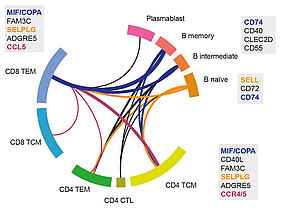Insight into the pathology of IgG4-associated diseases

Single cell sequencing deciphers pathogenic immune cell interaction in inflammatory pseudotumors of the brain.
IgG4-related diseases (IgG4-RD) are considered systemic diseases: they can affect virtually all organs and tissues of the body. Inflammation and tumor-like swellings (pseudotumors) in the affected tissues, which tend to scar, are typical of autoimmune diseases. They are caused by special antibody-producing cells of the immune system, immunoglobulin G4-producing B cells, which migrate into the tissues and multiply there. In rare cases, the brain may also be affected, causing severe neurological symptoms. The development of IgG4-related diseases is still poorly understood.
A platform developed at the Department of Neurology at the University Medical Centre Mannheim and the German Cancer Research Center (DKFZ), which is primarily used to identify tumor-specific T cells for personalized adoptive T cell therapy, particularly for patients with brain-derived tumors, now provides surprising insights into the pathology of this disease.
A research team led by Dr. med. Dr. rer. nat. Lukas Bunse, assistant physician at the Department of Neurology and team leader in the Clinical Cooperation Unit Neuroimmunology and Brain Tumor Immunology at the DKFZ, found that special T cells, which play a role in the formation of immunological memory, fuel the inflammatory process through an undesired interaction with immature B cells and cytotoxic T helper cells and possibly even initiate it.
"For the first time, we were able to describe a communication of T cells and IgG4-RD-associated B cells resulting in pathological effects," says Dr. Mirco Friedrich, first author of the currently published work. The scientists hope to be able to develop a targeted therapy for patients with IgG4-associated diseases on the basis of this defective combination. It would be conceivable, for example, to be able to prevent the pathological receptor-ligand interactions between the immune cells by means of monoclonal antibodies.
For the scientists, this discovery alone is not the only cause for celebration: "The fact that we can also apply the platform developed in recent years to rare neurological and autoimmunological diseases is an extremely exciting prospect," explains Professor Dr. Michael Platten, Director of the Department of Neurology and Head of the Clinical Cooperation Unit Neuroimmunology and Brain Tumor Immunology at DKFZ. "The platform is actually used to characterize immune receptors, based on single-cell sequencing and transcriptome analysis. The specificity of T-cell receptors and their applicability for therapy in the context of tumor diseases or autoimmunity is a particular focus."
"Single-cell sequencing has not only revolutionized basic science, but can also have added value in the clinic for differential diagnosis of rare diseases," adds Bunse.
Press release of the Medical Faculty Mannheim (German Language):
Original scientific publication:
Intrathecal activation of CD8+ memory T cells in IgG4-related disease of the brain parenchyma.
Friedrich M., Kehl N., Engelke N., Kraus J., Lindner K., Münch P., Mildenberger I., Groden C., Gass A., Etminan N., Fatar M., von Deimling A., Reuss D., Platten M., Bunse L.
EMBO Mol. Med. 2021 DOI: 10.15252/emmm.202113953
